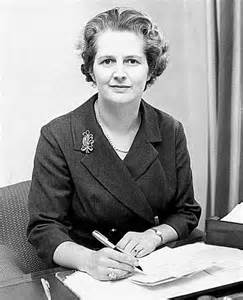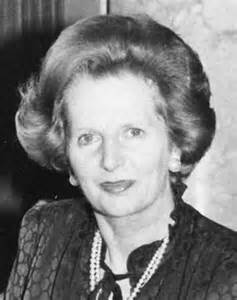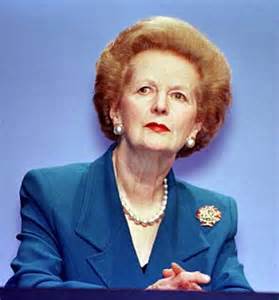Margaret Thatcher, one of the most famous women in the world in the latter half of the 20th Century, has died. She was 87.
Thatcher was Great Britain's first female prime minister. She rose from relative obscurity to the heights of British political power, winning three terms as leader of the Government before resigning before her third term had finished.
She was first elected in May 1979. She resigned in November 1990. In the intervening 11 years, she put her stamp on British politics and society, so much that her politics, called Thatcherism, still resonate as a descriptor for that time. A polarizing figure, she was a favorite of many of Britain's well-to-do and a figure of hate for many working class people.
She was born Margaret Roberts in 1925 in Grantham. Her father, Alfred, owned two grocery stores and served in local government, as an alderman and then as mayor of Grantham.
 Margaret was a studious child, earning a position as head girl at Grantham Girls' School. She also enjoyed playing the piano and sporting pursuits such as swimming and field hockey.
Margaret was a studious child, earning a position as head girl at Grantham Girls' School. She also enjoyed playing the piano and sporting pursuits such as swimming and field hockey.
At 22, Margaret graduated from Oxford, with a major in chemistry. Three years later, in 1950, she ran for Parliament, as a member of the Conservative Party. The youngest office-seeker that year (and the only female candidate), she lost the election, and the following one. At the end of 1951, she married Denis Thatcher. Two years later, the same year she earned a law degree, she gave birth to twins, Mark and Carol. In addition to rearing her children, she continued to work and be politically active. She specialized in patent law and tax law.
In 1959, she won election to Parliament. Two years later, she was named parliamentary secretary to the minister of pensions and insurance. The Labour Party was in power from 1964 to 1970, and Thatcher had various posts in the shadow government. When the Conservatives won control of Parliament in 1970, Prime Minister Edward Heath named Thatcher Secretary of State for Education and Science. She was the only woman in Cabinet.
Thatcher quickly rose through the ranks, so much so that when Heath resigned as party leader after Labour won the 1974 election, the Conservative Party turned to Thatcher as their leader.
She built up a name for herself in the next few years for being what she termed herself "a conviction politican," someone who would stick by her political beliefs even though they might be unpopular. Those convictions and her publicity for adhering to them earned her the nickname the "Iron Lady," which she embraced.
Labor unrest in the late 1970s was quite high, punctuated by several high-profile worker strikes. The winter of 1978-1979 was called the "Winter of Discontent." Thatcher and the Conservatives offered voters a different look, and the result was a victory in the 1979 election, with Thatcher becoming her country's first female Prime Minister.
In her time as Prime Minister, Thatcher cut taxes for the wealthy, increased the value-added tax, and embarked on a plan to sell many state-owned enterprises. (The U.K. at the time owned businesses in many parts of society, such as steel plants, electricity providers, and railroads.)
 These programs proved unpopular with large sectors of the British population. Large riots took place in 1981, in response to the country's continued economic woes. Things changed a bit in 1982, when the Government declared war on Argentina for seizing control of the Falkland Islands, which the U.K. had maintained ownership claims on for many years. The resulting 10-week war (which resulted in a British victory but hundreds of dead on both sides) proved very popular in Britain, and Thatcher's decision to call an election soon after resulted in another Conservative term as leaders of Government.
These programs proved unpopular with large sectors of the British population. Large riots took place in 1981, in response to the country's continued economic woes. Things changed a bit in 1982, when the Government declared war on Argentina for seizing control of the Falkland Islands, which the U.K. had maintained ownership claims on for many years. The resulting 10-week war (which resulted in a British victory but hundreds of dead on both sides) proved very popular in Britain, and Thatcher's decision to call an election soon after resulted in another Conservative term as leaders of Government.
During this time, tempers were continuing to flare in Northern Ireland, which was part of the United Kingdom by law but not in the hearts of many Irish people who lived there. Thatcher survived an assassination attempt by members of the Irish Republican Army.
Thatcherism proved unpopular with trade unions throughout Thatcher's three terms in office. Strikes were not uncommon. One particularly well-known strike was the miners' strike of 1984-1985. Miners were on strike for nearly a year, in response to the Government's plans to close dozens of state-owned coal mines and put 20,000 miners out of the work, but the Government refused to negotiate and the strike ended without a deal. The Government eventually closed even more coal mines than were planned.
Thatcher also made headlines for her strong relationships and close friendships with two other powerful world leaders, U.S. President Ronald Reagan and Soviet leader Mikhail Gorbachev. Of the latter, Thatcher said, in 1984, "We can do business together." Thatcher and Reagan held similar political views and were on very friendly personal terms as well.

In 1987, after her visit to Moscow, Thatcher and the Conservatives won a third straight election, something that hadn't been done in the 20th Century. She embraced a Community Charge, commonly called a poll tax, that proved very unpopular with much of the British public, including MPs, and continued to speak out against British involvement in the European Community, again putting her at odds with a majority of her countrymen and countrywomen. Her strong leadership style wasn't for everyone, and several members of the Government, most notably Chancellor of the Exchequer Nigel Lawson and Deputy Prime Minister Geoffrey Howe, resigned. Thatcher herself resigned as party leader in 1990.
She was named Baroness Thatcher in 1992, which meant that she could sit in the House of Lords, the upper house of Parliament. After a few years, though, she withdrew from public life.
In ill health for years, she died of a stroke in 2013. Her husband had died in 2003.